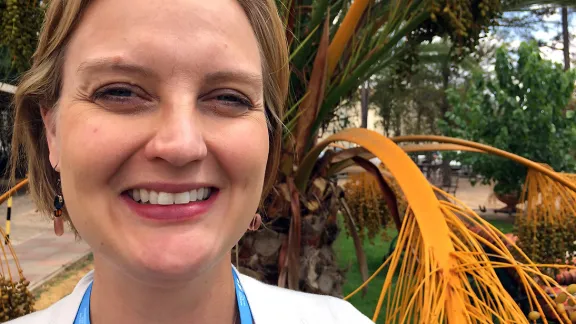
Kathryn Mary Lohre, a participants at the LWF conference on Global Perspectives of the Reformation. Photo: LWF/I. Benesch
I arrived in Windhoek, Namibia, eager to explore the themes of the conference, Global Perspectives on the Reformation: Interactions between Theology, Politics, and Economics. After only one full day, I have experienced the dynamic interplay between our diverse contexts, and the cross-contextual engagement that enriches our self-understanding as a global communion, which is both a gift and a task.
Today’s focus was on the role of theology in contemporary societies. Several presenters spoke about the role of theology in the service of humanity, human dignity and justice. Prof. Ezra Chitando of Zimbabwe lifted up a proverb of the Shona people of Zimbabwe, “muromba munhu,” meaning a poor person is a human being, as a revolutionary challenge to the churches.
Danielle Dokman, of Suriname, spoke of the need for theology to contribute to the justice of the people, creating “new and insightful thoughts about God” and challenging “structures, systems and realities.” Rev. Dr Kenneth Mtata of both Zimbabwe and Switzerland noted the central place of anthropology in our theology, holding in tension both the majesty and the lowliness of being human, based on exegesis of Psalm 8.
Dr Mary Joy Phillip of India and Canada offered up the indigenous model of “The Three Sisters’ Garden” as a metaphor for re-ordering our understanding of the inter-connected relationship between politics, economics, and theology.
The concept of the garden is to plant corn, beans and squash in a configuration that serves, protects and sustains the whole, while providing each plant in relationship to the others with the optimal nourishment and environment. In the analogy, theology is the squash - working on the margins “between and betwixt” the political and economic realms to provide protection to the whole, and to ensure that “the center holds.”
Mary Joy concluded that this reconfiguration will serve, in the words of author Arundhati Roy, “to make another world possible.” This is, perhaps, the central hope of our exploration of the Reformation, and its continued relevance for our lives and societies today.
Kathryn Mary Lohre is the Assistant to the Presiding Bishop of the Evangelical Lutheran Church in America, and Executive for Ecumenical and Inter-Religious Relations.


